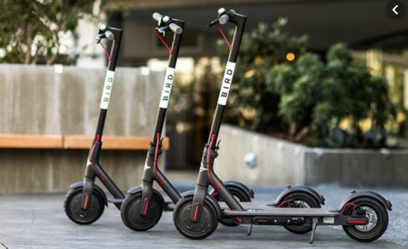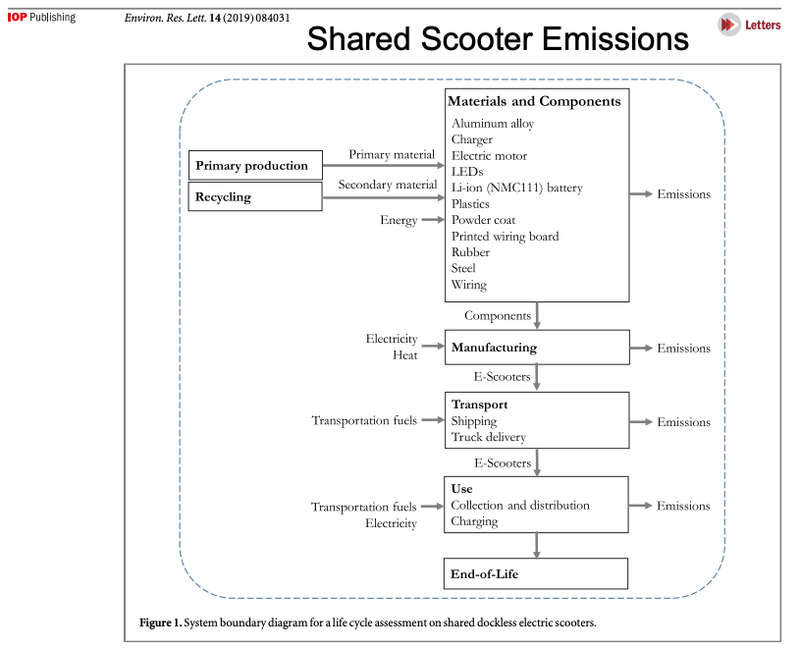Attention Millennials: New Study Reveals E-Scoot
Post# of 65629
Attention Millennials: New Study Reveals E-Scooters Aren't As Green As They Seem

A new study shows shared electric scooter schemes, popularized by Bird, Bolt, Lime, Lyft, and Spin, might not be as green as you think, could actually be damaging the planet.
Researchers from North Carolina State University discovered that shared electric scooters are more environmentally friendly than automobiles, but not when compared to particular forms of public transportation, bicycles, and walking.
Millennials tend to consider themselves as an eco-friendly generation, embracing all new forms of "carbon-free technologies," like electric scooters.
But what the scooter companies aren't telling them are the emissions from manufacturing (like the lithium-ion battery and aluminum parts), transportation (shipping the scooter from China or Southeast Asia), and maintenance of a scooter fleet (collecting, charging, and redistributing scooters) is rather dirty for the environment.
"If you only think about the segment of the life cycle you can see, which would be standing on the scooter where there's no tailpipe, it's easy to make that assumption," Jeremiah Johnson, corresponding author of the study and an associate professor of civil, construction and environmental engineering at NC State, told The Verge. "But if you take a step back, you can see all the other things that are a bit hidden in the process."

Johnson and his research staff determined that the average global warming impact for a shared electric scooter is 202g of CO2 per mile traveled.
About 50% of the carbon footprint per mile traveled is from materials and manufacturing, and 43% is from the collection and distribution process to recharge the fleet. A little less than 5% of the environmental impact is from electricity used to charge them.
At 202g of CO2 per mile traveled, the shared electric scooter is a much cleaner alternative versus the automobile at 414g of CO2 per mile.
Public transportation, like a bus, only emits 82g of CO2 per mile, and the use of a private bike at 8g of CO2 for the same distance. So it seems that conventional ways of moving around a metropolitan area are much cleaner than renting electric scooters.

Researchers said, "the goal of this study is to identify the key drivers for adverse environmental impacts, to offer recommendations on policies or practices that would reduce these impacts, and to compare the overall impacts to other modes of transportation."
They first said third parties who drive around towns collecting scooters for charging have to limit their CO2 usage.
A scooter company called Lime could be soon introducing a new option that allows people to reserve a scooter ahead of time, thus reducing the amount of unnecessary driving that takes place when collectors are out searching for scooters to recharge.
Researchers said scooter companies need to build better scooters that last longer, could be a temporary solution to reduce the environmental impact.
"If the scooter companies are able to extend the life of their scooters without doubling the impacts of materials and manufacturing, that would reduce the per-mile burden," Johnson said. "If you can make these things last two years, it would have a very large impact."
Scooter company Bird could soon unveil its next-generation scooter with a longer-lasting battery and more durable parts. Lime has also rolled out more advanced models to improve the economics of its business.
And it was only in April when a German study published by Christoph Buchal of the University of Cologne, said electric automobiles have "significantly higher CO2 emissions than diesel cars."
Buchal said that is due to the significant amount of energy used in the mining and processing of lithium, cobalt, and manganese, which are critical raw materials for the production of electric car batteries.
So maybe the green movement with electric automobiles and scooters to save the world is the biggest scam of our lifetime...
 (0)
(0) (0)
(0)